I have already commented on several occasions that works of historical fiction cannot be required to be absolutely faithful to the events in which their narration is set. Neither do they intend it nor is it their objective, since they are not essays or historical documentaries. Therefore, what I am looking for with this entry is not the typical article that dismantles with some indifference the plot of a historical book or film, reviewing its errors.
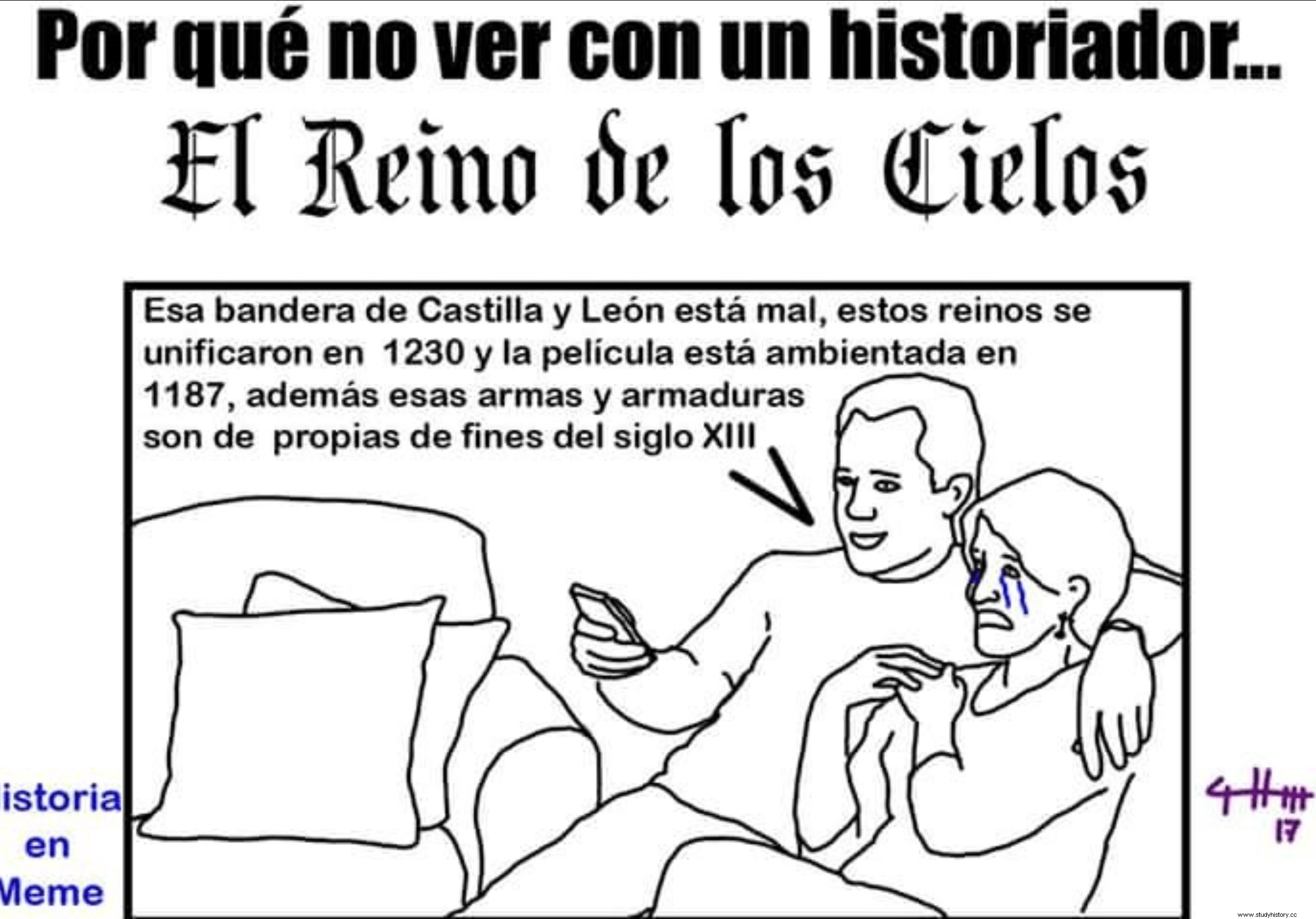
This series of posts (there will be two, given that the topic is complex and its length would greatly exceed the usual blog) is addressed to those who after seeing The King They are curious to know the true story of the events and the characters portrayed in the work. Also to those who without seeing the film want to know the story of a king and a fascinating historical period. And yes, also to those who (I suppose there will be some) have the intention of seeing it and do not care if someone completely spoils the plot for them. Of course, if you want to see it, you haven't done it yet and the so-called "spoilers" bother you, I recommend that you leave reading this entry until after you see The King . To make it easier to follow the narration, those comments that refer to the plot of the film are in italics, while those referring to historical reality are in non-italic letters.
This is a history page, not a cinema page, so we will not talk about the quality of the film as a cinematographic product, the suitability of the chosen actors or their interpretation . Nor will we dwell on details about costume reliability, characterization or military impedimenta, focusing on historical facts.
One last clarification:since there are several blog entries where episodes or characters referred to in this article are narrated in detail, there are links to them for those who want to go deeper in some specific aspect of the treaties here.
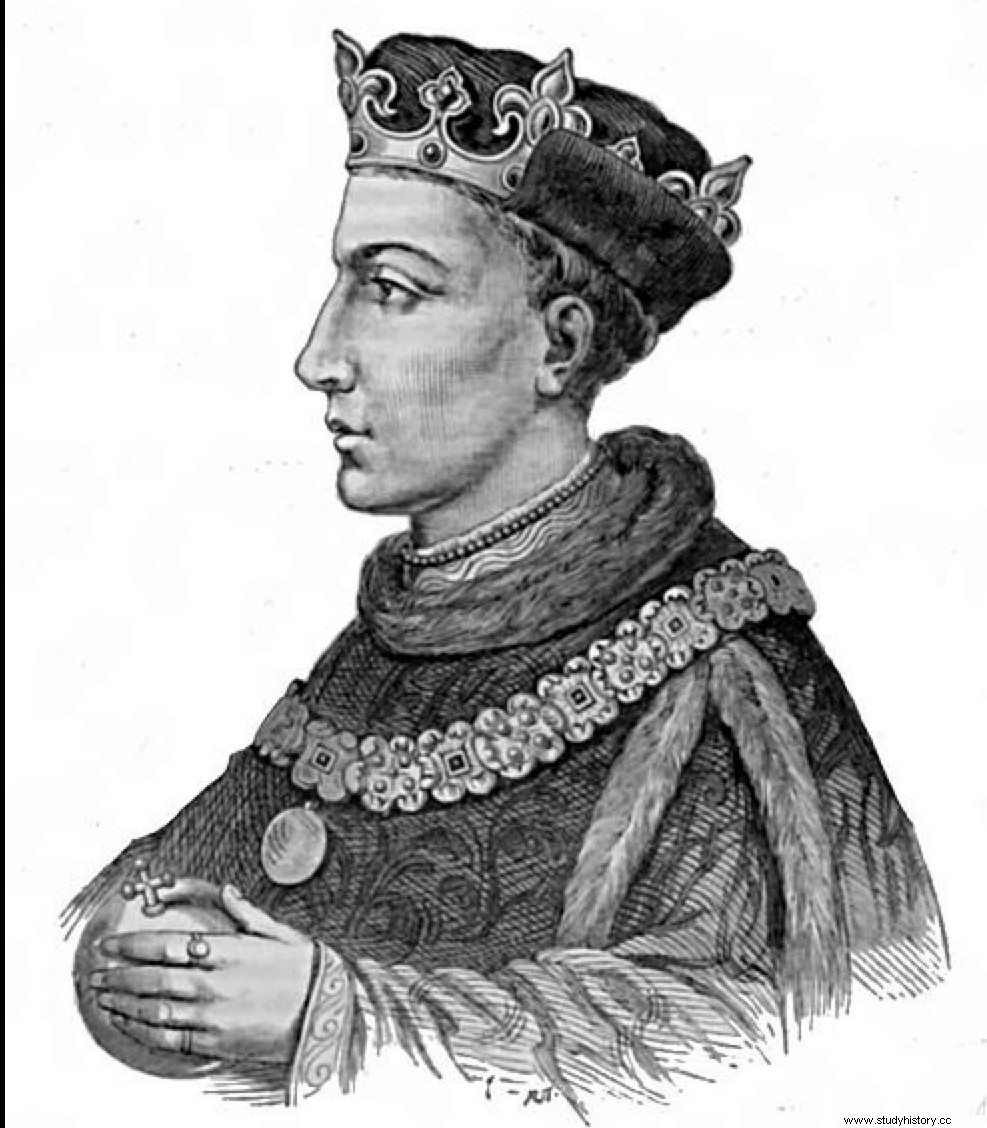
– The protagonist and the change of character of him after accessing the throne. It is inevitable to start this entry explaining who is the king that gives the film its title. This is Henry of Monmouth, King of England with the name of Henry V from 1413 to 1422. The film describes how before ascending the throne he led a life in which he did not assume any responsibility and gave himself with frequently to drink and party with his friends. However, almost miraculously, when his father dies and ascends the throne, he is completely transformed, assuming with integrity and full willingness the tasks of his new rank.
Although during the last years of his father's reign Prince Henry had drawn attention for his dissolute behavior, this had not always been the case. Part of the blame for this attitude was due to the fact that all his initiatives to take part in the government and the decisions of the country had been systematically rejected by his father. And indeed, the accession to the throne meant something more for Henry of Monmouth than wearing a crown and being called Henry V. There was a radical transformation in his behavior. The cause of this must be found in the change that meant going from being impotent to assist the brake that his father put on all his ideas and government initiatives to seeing himself overnight in a position to carry them out without a higher power that was oppose him.
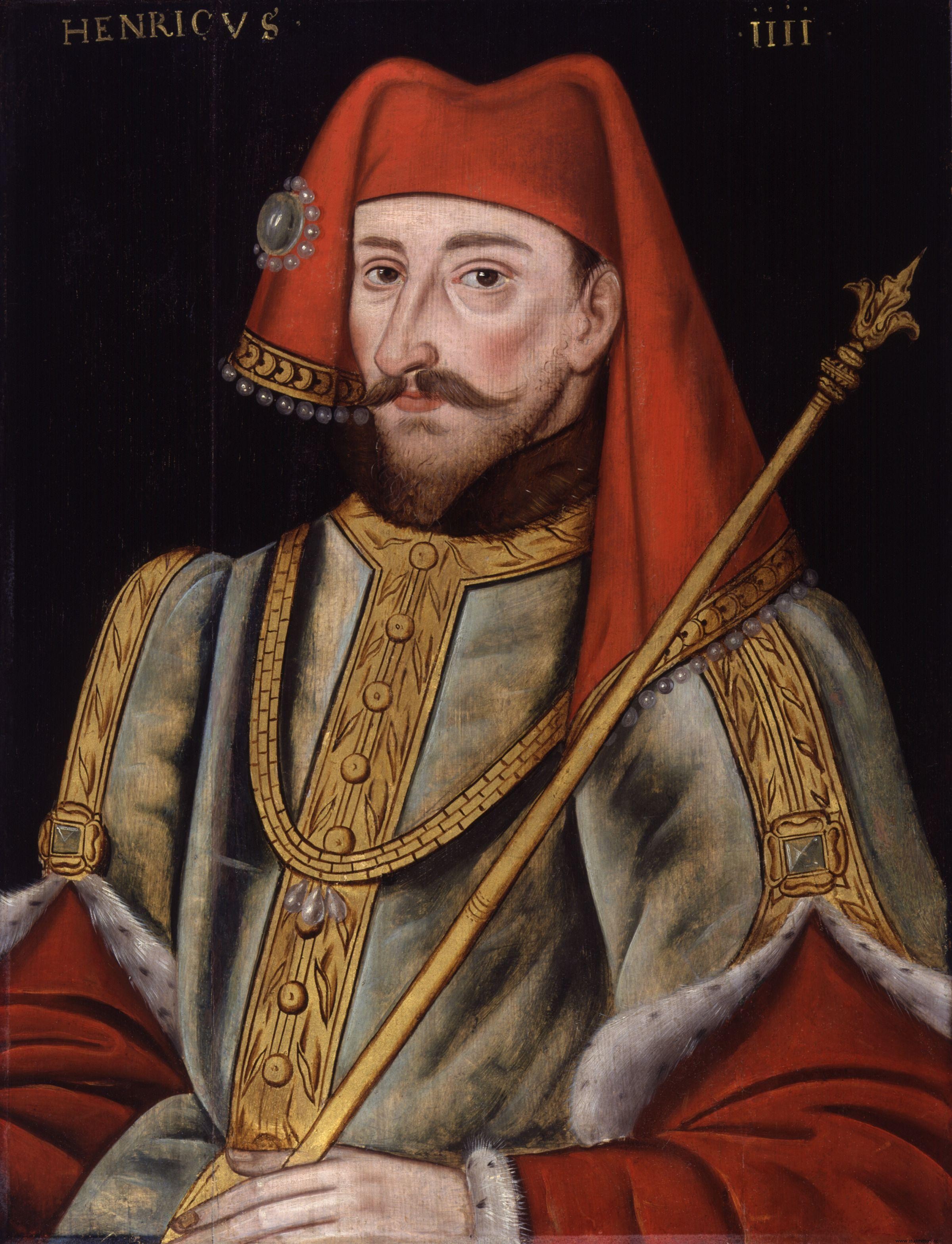
– The relationship with his father e: in the film Prince Henry has a more than tense relationship with his father Henry IV, whom he refuses to visit, even suspicious of the news that reaches him of his illness. Enrique IV proposes that he be disinherited in favor of his brother Thomas de Clarence and only on the deathbed of the monarch does he reconcile with his son and give him the crown .
During the reign of Henry IV, relations between father and son were complicated. Enrique IV dragged the stigma of usurper of the throne of England after deposing his cousin Ricardo II. Something that his son did not take well. On the other hand, although in general the relationship between the two had been good, it was inevitable that, as the heir grew older and tried to impose his criteria, differences would arise between them.
In 1410, the prince proposed two people he trusted to run the kingdom, but later that year they were deposed by Parliament at the king's suggestion. In the same session a motion proposing that the king abdicate in favor of his son was dismissed. In 1412 the prince was accused of having appropriated funds intended for the garrison of Calais. Determined to defend himself against him, he traveled to London accompanied by his Praetorian Guard of young noblemen and a multitude of followers. He arrived at Westminster on a war footing. The interview with his father, who promised himself stormy, ended with the prince reiterating his loyalty to the king and with father and son reconciled, as can be seen, not on Henry IV's deathbed, but already a year before his death. death. However, the differences between the two would probably have continued to grow if it had not been for the fact that Henry IV's state of health was deteriorating by leaps and bounds. He died on March 20, 1413.
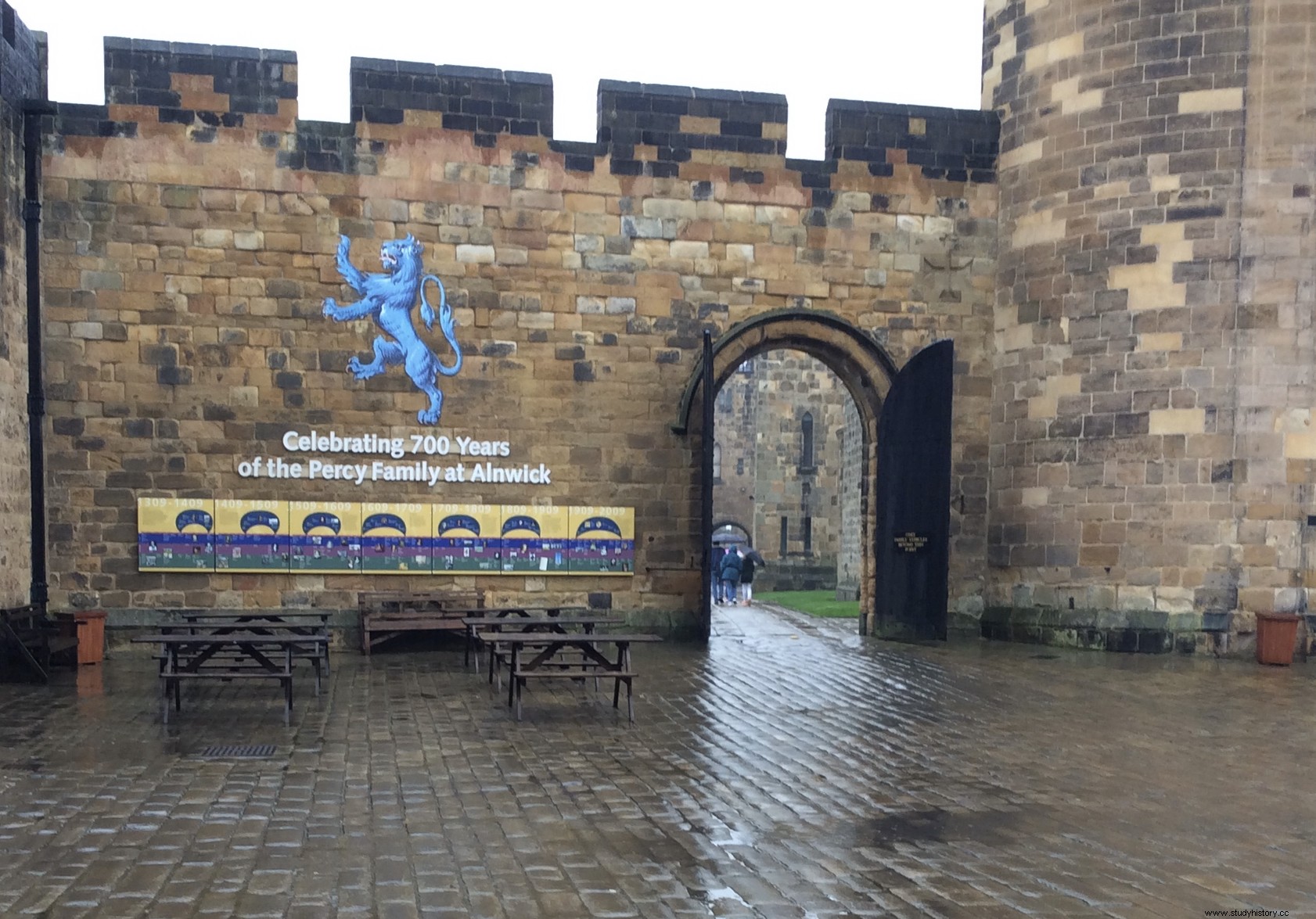
– Henry Hotspur Percy:in the film the young Henry Percy, after defending the interests of Henry IV in Scotland, rebels against him accusing him of not wanting to pay the ransom of his cousin Mortimer, in the hands of Welsh rebels, and raises an army against the king. He sets out to meet the threat with another army led by Prince Harry's brother (Thomas de Clarence), heading to meet Percy. Prince Harry arrives on the battlefield and challenges Percy to single combat, defeating and killing him.
The Percy family, Earls of Northumbria and with their power based on the formidable Alnwick Castle, were one of the most powerful clans in the country, especially in the north, border area with Scotland. Henry Percy was Earl of Northumbria, the brother of Thomas, Earl of Worcester and the former's son, Henry Hotspur , was appointed King's Representative in Cheshire and North Wales. In this way, the Percys became the main bastion of Henry IV in the north and west of the country. From now on, and to avoid cumbersome repetition, we will refer to them as Northumbria, Worcester and Hotspur .
All seemed to be looking good when in the fall of 1402 the Percys led an English army that defeated the Earl of Douglas's Scots at Humbleton Hill. But after the battle, the family complained about the Crown's lack of financial support for their efforts to defend the kingdom. When Hotspur requested permission to personally collect the ransom from the Earl of Douglas, Henry refused. He also did not allow her to pay out of her own means the ransom of his brother-in-law, Edmund Mortimer, held captive by the Welsh rebel Owain Glyndwr. It was not only a financial question, since Mortimer could wield a better right to inherit the crown than Henry IV himself (we have already discussed the accusations of usurper of the throne that weighed on him). The king therefore had no wish to see Mortimer released.
After a stormy session of Parliament in which Henry IV branded Hotspur a traitor and physically threatened him, he went to Wales. he joined with the Welsh rebels and with other members of the Mortimer family. They advanced towards England, where they were joined by Worcester and where they intended to join forces with Northumbria.
But the king was quick to react and, before Northumbria could join his son, confronted Northumbria on July 21, 1403 at Shrewsbury. Henry IV was victorious, Hotspur lost his life in battle (but not in single combat with Prince Henry), and Worcester was subsequently executed. The king's eldest son, Henry of Monmouth, was wounded and took with him as a souvenir of the battle a scar that would accompany him throughout his life, a detail that is taken care of in the film where that mark can be seen on the face of the main character, although the real scar was much more marked than that of the character in The King .
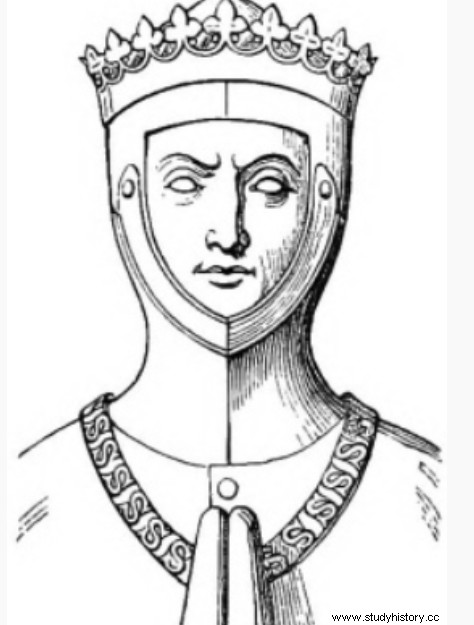
– Thomas, Duke of Clarence. In the film, Prince Henry's younger brother, Thomas, Duke of Clarence, is designated heir to the throne by his father Henry IV, to the detriment of the eldest son Henry. He also gives him the command of the army that must fight the rebellion of Henry Hostspur Percy. After Henry kills Hotspur in combat, news arrives that this singular engagement has not actually prevented the battle (not seen on screen) and that Thomas of Clarence has perished in it.
Thomas, Duke of Clarence was the second son of Henry IV and thus heir to the throne if his older brother Henry perished without issue. But he neither became designated heir to the crown nor perished in England nor did he in the same battle of Shrewsbury in which he died Hotspur Percy.
It is true that at one point Henry IV appointed Thomas de Clarence to lead an army instead of entrusting it to his eldest son Prince Henry. But it was in France and in 1412. In the Gallic country there was a conflict for power. Henry IV decided to support the side of the Orléans, who had promised to return the Duchy of Aquitaine, and sent a larger force, but he put in command of it not the Prince of Wales, but his younger brother, the Duke from Clarence. However, when the English arrived in France, the two fighting sides had reached an agreement that did not take Henry IV into account at all. His army had to return while the Prince of Wales angrily protested that he had not been appointed to lead the English.
As for the death of Thomas de Clarence, it occurred in France in 1421, almost twenty years after his death in The King . Henry V, after his victory at Agincourt and his marriage to Catherine of Valois, had left his brother the Duke of Clarence as representative in France, but not the whole country was pacified. There were still areas dominated by the Dauphin and others by the Duke of Burgundy. Precisely, in a confrontation with forces loyal to the dauphin at Bougé on March 22, 1421, Clarence was killed and Henry had to return to France to personally take care of his affairs there, which would also cost him his life. In that campaign he fell ill with dysentery and died in Vincennes on August 31, 1422.
With this note ends the first of the two entries in this series. We leave for the second entry such interesting questions as the reasons for the execution of the Earl of Cambridge (and his relationship with Castile), the conflict with France, the figure of the dauphin Carlos, the battle of Agincourt, the character of Falstaff and, of course, , marriage to Catherine of Valois.
For more information on the topics discussed here you have at your disposal my book The Plantagenets and you can pre-order (it will be published in January) my next play, What Shakespeare Didn't Tell You About the Wars of the Roses.
Image| Wikimedia Commons, author archive.
